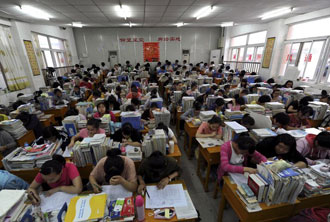Over 90% of people in Shanghai believe that those who are honest and trustworthy are at a disadvantage, according to a 2011 survey by the Shanghai Academy of Social Sciences reports Beijing’s Economic Information Daily.
Honesty and moral values come under siege from an early age, judging by the number of services that write school paper and advertise answers to exam questions. A Baidu search for “writing research papers” turned up over 20 million results, according to WantChina.com. The first page of results featured firms that act as go-betweens between cheating students and the paper writers.
During the school exam periods online ads pop up offering answers to exam questions. Stories abound of students who entered top colleges and grad schools by using these cheating services. Cheating is so commonplace that it has come to seem like an entitlement in the minds of some students. In June several Hubei province teachers who caught students cheating at a high school were physically attacked by their students.
Lying and cheating have come to be considered acceptable or even admirable among many young people judging by the recent popularity of games that reward those who are best at being dishonest.
The resort to mendacity to achieve desired ends has even spilled into the legal system. Since 2011 prosecutors in Jiangsu uncovered over 1,563 lawsuits involving 390 million yuan ($64 million) which were filed based on falsified evidence.
The pervasiveness of lying and cheating pose a real danger to society itself, says Lu Xiaowen, deputy director of the Institute of Sociology at the Shanghai Academy of Social Sciences. If people come to perceive one another to be dishonest and untrustworthy the world will become a treacherous place for all, he says.
This trend may be borne out by recent surveys conducted by the Chinese Academy of Social Sciences showing that about 70% of respondents don’t trust strangers. —Day Nahm Kagy


